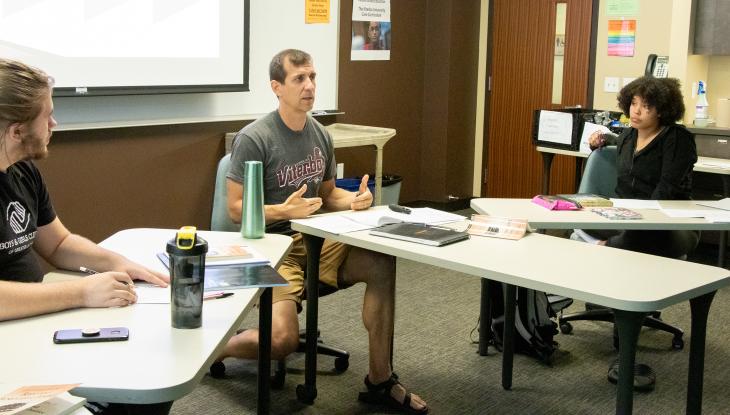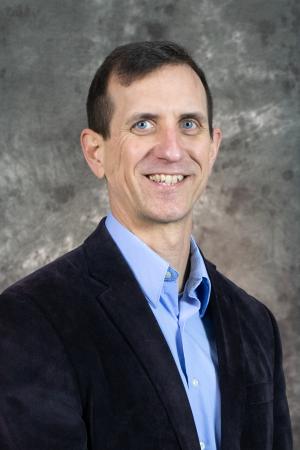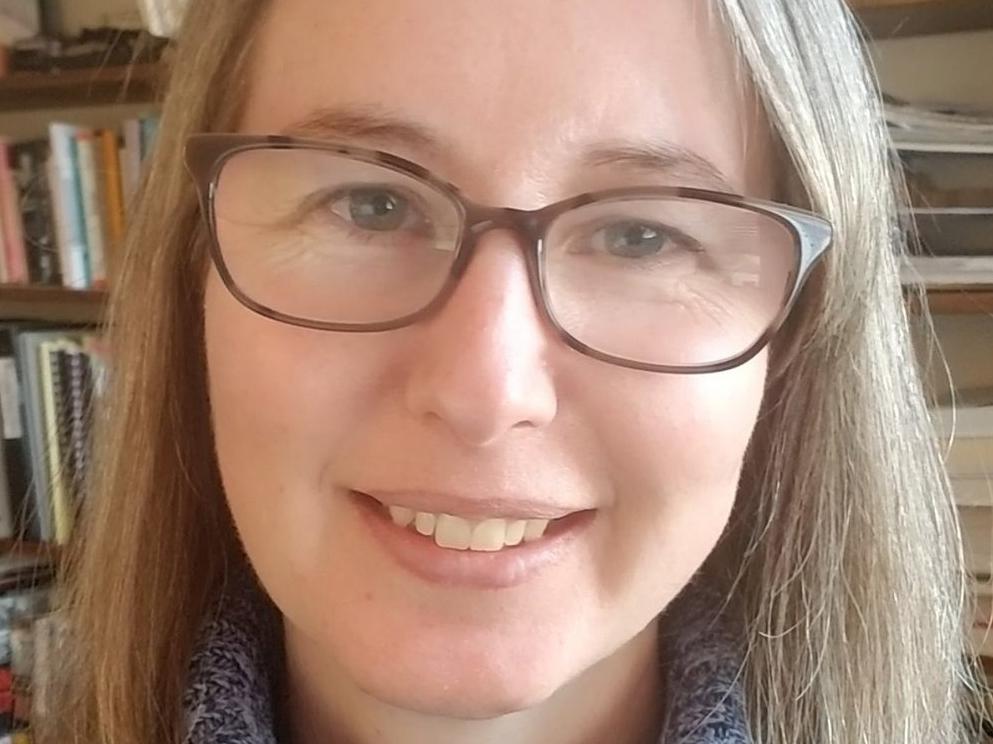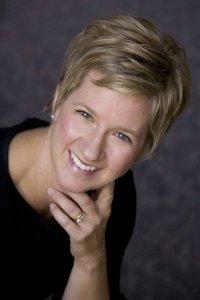A professor in the Ethics, Culture, and Society program at Viterbo University, Matthew Bersagel Braley also is director of the university’s Honors Program. He teaches both undergraduate and graduate seminars that dig deep into pressing social issues.
From 2010-2017, he served as a faculty member and administrator for Viterbo’s Master of Arts in Servant Leadership program. He also has served as the chaplain for the Viterbo cross country team.
He was named Viterbo’s Teacher of the Year in 2020.
Prior to coming to Viterbo, Bersagel Braley completed a bachelor’s degree in Africana Studies and English at Luther College, where he was on the track and cross country teams. He then earned a master’s degree in religion and theology from United Theological Seminary of the Twin Cities and a PhD in religion (ethics and society) and a certificate in human rights from Emory University, where he was a fellow at the Center for Health, Culture and Society at Emory’s Rollins School of Public Health.
His earlier research focused on the intersection of theology, religion and global health in the primary health care movement and the response to the global AIDS pandemic.
He has been active locally in public health conversations as part of the Health Sciences Consortium Population Health Committee and as a member of the annual health summit planning team as well as the Bioethics Network of the Upper Midwest. He continues to learn from colleagues around world as a fellow with the Leading Causes of Life Initiative, an international collaboration of scholars and practitioners committed to organizing our institutions and communities around that which promotes human flourishing.
In addition to his work in health, he served as executive director of Southern Truth and Reconciliation, a university-community partnership highlighting reconciliation practices of communities confronting legacies of racial violence. His commitment to racial and social justice continues to inform his classroom teaching as well as community engagement through the Creating a Healthier Multicultural Community initiative. From 2010-2017, he served as a faculty member and administrator for Viterbo’s Master of Arts in Servant Leadership program.
In undergraduate and graduate seminars as well as in his role as director of the Honors Program, Bersagel Braley invites students to reflect on what is theirs to do in responding to the pressing social issues of our time — from global health and interreligious conflict to economic inequality and political polarization. In mission seminars focused on revitalizing neighborhoods here in the Coulee Region and in study abroad courses that emphasize solidarity with our global neighbors in Africa and the Caribbean, he is passionate about getting students out of the classroom and into the community to serve and learn with persons and populations whose voices are too easily and too often ignored.
For details about his academic research projects, see his online staff biography.
How (and/or why) did you come to be at Viterbo?
I was nearing the end of my doctoral program at Emory University in Atlanta and looking for jobs at small, liberal arts universities. It just happened that we were back in the La Crosse area for Christmas visiting family (my wife, Kari, grew up in West Salem). I looked at the Viterbo job openings and saw the posting for a faculty and administrative position in the Master of Arts in Servant Leadership program.
It was not a position that was posted on any of the usual job lists in my field of religion, so it had not been on my radar. Serendipity? Providence? Luck? Something else?
Whatever the reason, we could not have asked for a better opportunity to return to the Midwest near our families, especially at a time when we were expecting our second child.
In that first year, the faculty and students in the MASL and the Religious Studies and Philosophy program modeled for me what it meant to pursue the life of the mind in and through community, not simply for understanding the world, but for transforming it through radical hospitality.
What are you best known for teaching?
I teach both undergraduate and graduate seminars that invite students to reflect on what is theirs to do in responding to the pressing social issues of our time — from global health and inter-religious conflict to economic inequality and political polarization. I am best known for teaching (and badgering students to enroll in) the study-abroad course in South Africa every other year. I also teach one of the first-year mission seminars, bringing in my passion for understanding how in an increasingly displaced, digital world we shape and are shaped by our sense of place.
What do you love most about teaching at Viterbo?
The daily possibilities for transformational, relation-based learning inside and outside the classroom. It is a place where I learn, daily, from our students, how to connect what they are learning across our classes to how we might better serve our neighbors — both near and far.
What inspires you?
I am inspired when students recover their own curiosity about who the storytellers are in a society, why history and its interpretations matter, how religion animates daily rhythms. When they pay attention to these dimensions of human experience, they find their own experience of being human broadens and deepens. That is what makes teaching college students both a joy and a privilege and, ultimately, anchors my hope that a more just and compassionate world is possible.
What advice would you give to students regarding heading out into “the real world”?
I am always hesitant to distinguish the campus world from the real world. While there are unique dimensions of our university community, the “real world” breaks into the lives of our students and our classrooms daily – often in unexpected ways and difficult ways. What holds on our campus, holds also in the communities they will become part of after they graduate: you will be invited daily to “creatively engage in an imperfect world.” How you respond to that invitation over your lifetime will be a much more accurate assessment of the real value of your Viterbo education than any one course or exam.
Do you have a little-known fun fact about yourself that would surprise students?
The summer after I graduated from college I hitchhiked back to Iowa from Tennessee when the car we were driving to help friends move broke down near Chattanooga.
What do others say about you?
Here are a few comments from students:
“Matthew is a professor that goes above and beyond for his students and allows his students to engage and culturally connect to difficult concepts and how they affect everyday life. He is very passionate, and I am so glad that I got the opportunity to be in his class.”
“As our Honors Program director, he brings inspiration, humor, creativity, and leadership to each student’s experience.”
“It still holds true that my time in your classroom and abroad in South Africa with you have had the greatest impact on my life and career.”
“I will always be grateful to him for encouraging me to be vulnerable and step outside of my comfort zone to better myself, and expand my knowledge.”




